Our Announcements
Sorry, but you are looking for something that isn't here.
Posted by admin in YOU LIVE IN OUR HEARTS on November 19th, 2013
Lt Syed Yasir Abbas Shaheed
The Shuhadaa Are Not Dead
وَلَا تَقُولُوا لِمَنْ يُقْتَلُ فِي سَبِيلِ اللَّهِ أَمْوَاتٌ’
بَلْ أَحْيَاءٌ وَلَٰكِنْ لَا تَشْعُرُونَ
“And do not say of those who are slain in the way of Allah that they are dead. Instead, they are alive, but you perceive not.” (2:154)
One who dies in the cause of Allah is a Shahid (Martyr) and, although, it is correct and even allowed to call him “dead”, yet we are forbidden to regard their death like ordinary deaths. For, though, life in Barzakh is given to everybody which gives him perception of reward and punishment but Shahid in the Barzakh life is qualitatively different from the one given to other persons. The distinction a Shahid has over others in Barzakh is that in effect, for the fullness and sensitivity of life, his perception is, keener and deeper. As, for instance, the life sensation is there in finger tips, as also, it is there in heels, but the sensitivity of finger tips is sharper than that of heels. The effect of the finer life-quality of a Shahid in Barzakh reaches his physical body as well; whereas ordinarily bodies remain unaffected. Consequently, a Shahid’s body does not waste away, decay or mingle with dust.
FACEBOOK PAGE: https://www.facebook.com/pages/In-loving-memory-of-shaheed-Ltsyed-Yaser-abbas-Sitar-E-Basalat/176973199025900
Posted by admin in Gen (Retd) Musharraf on November 19th, 2013
Musharraf ?
By
Inam Khawaja
The facts about General (Retd) Syed Pervaiz Musharraf have not been correctly and fully reported in both Pakistani and international media. It is therefore necessary to put on record all the facts.
Musharraf’s father Syed Musharraf uddin was a graduate from Alighar Muslim University. After graduation he joined the office of the Director General Civil Supplies Government of India in a clerical position. In 1947 he opted for Pakistan and was transferred to the newly established Ministry of Foreign Affairs in Karachi. In 1949 he was posted in the Pakistan Embassy Ankara. On his return from Ankara (in 1956) he progressed in his career retiring as a section officer in the Ministry of Foreign affairs. He was not a member of the Foreign Service.
Musharraf’s mother Begum Zehra Musharraf did her Masters in English literature from Indraprastha College Delhi. After the family’s return from Ankara she joined ILO in a secretarial position and retired in 1986-87.
Pervaiz Musharraf was born on August 11, 1943 in Delhi (Daryagunj). He was four years old when he came to Pakistan with his parents. In Ankara he was home tutored by a German teacher, he is fluent in English and Turkish. On return from Ankara in 1956 he attended Saint Patrick’s High School Karachi and passed the matriculation examination (not O level) in 1958 thereafter, he joined Forman Christian College in Lahore. He did not complete his degree just passed F.Sc.
Musharraf got married in 1968 to Begum Sehba Musharraf and has one son,
Bilal Musharraf, and a daughter, Ayla. Both are married with two
children of their own. His son lives in Boston. His brother also lives in the
United States. Both are US Citizens.
Personal Likes
Musharraf is fond of designer suits (Armani), handmade shoes however; his recent pictures show that he has not kept up to date because he is wearing jackets with broad lapels!! He smokes Cuban cigars, enjoys Pakistani music and the company of friends.
Army Career
In 1961 he entered the Pakistan Military Academy at Kakul as a cadet and was commissioned in the Pakistan Artillery in 1964. He is a graduate of the Staff College, Quetta, the National Defense College and the Royal College of Defence Studies, United Kingdom.
On 5, September 1965 General Court Marshal Proceedings were initiated against Musharraf for absenting from duty for a full week without permission but, were squashed due to the attack on Pakistan by India on the morning of 6, September 1965. As a result Musharraf escaped being cashiered from the Army and participated in the Indo-Pakistani War of 1965 as a 2nd Lieutenant in the Self Propelled Artillery Regiment and was awarded Imtiazi Sanad for gallantry. In the Indo-Pakistani War of 1971 he fought as a Company Commander in the SSG Commando Battalion.
He has commanded Regiments of Artillery, an Artillery Brigade and then went on to command an Infantry Division. He was promoted Lt. General in 1995 by Benazir Bhutto. In 1998 he was recommended for appointment as COAS by Prime Minister Nawaz Sharif in supersession of Lieutenant- General Ali Kuli Khan, who was the senior most and the second in line Lieutenant-General Khalid Nawaz Khan.
Relations with General Zia-ul-Haq
After General Zia-ul-Haq’s coup detate on 6, July 1977 Musharraf was chosen for special assignments, he served in District Martial Law Administration HQ. After the Soviet invasion of Afghanistan in December 1979 Musharraf was involved in the preparation of Mujahedeen for the Jihad in Afghanistan. Zia chose him to command the newly raised SSG base at Khapalu in Siachin area. In 1987 when Musharraf’s name came up for the post of Military Secretary to President Zia-ul-Haq his commanding officer wrote; “he is not at home with pomp and show”. This saved his life because Zia’s military secretary died with him in the air crash in August 1988.
Relations with Benazir Bhutto
In 1988–89, (as Brigadier) Musharraf proposed the Kargil infiltration scheme to Prime Minister Benazir Bhutto but she rebuffed the plan. After promotion Major-General Musharraf worked closely with the Chief of Army Staff as Director-General of Pakistan Army’s Directorate General for the Military Operations (DGMO). During this time, Musharraf became close to the Director General of ISI Lieutenant General Javed Nasir and had worked with him while directing operations in the Bosnian war. His political philosophy was influenced by Benazir Bhutto who mentored him on various occasions and he became close to her on military policy issues and India. During 1993–95, Musharraf repeatedly visited the United States as part of Benazir Bhutto’s delegations. It was Maulana Fazal-ur-Rehman who lobbied for his promotion to Benazir Bhutto, and subsequently getting his promotion papers approved by Benazir Bhutto which eventually led to his appointment in Benazir Bhutto’s key staff. In 1993, Musharraf personally assisted Benazir Bhutto to have a secret meeting in the Pakistan Embassy in Washington, D.C. with officials from Mussad and the special envoy of Israeli premier Yitzhak Rabin. It was during these visits that Musharraf developed extremely cordial relationship with Shaukat Aziz who, at that time, was serving in a very senior position heading the global financial services of the Citibank.
After the collapse of the fractious Afghan government in 1994 Musharraf assisted General Babar and ISI in devising a policy of supporting the newly formed Talibangovernment in their war against the Northern Alliance.
His Failing Trait
Even a casual glance at what is in public domain reveals that he often acts impulsively without fully evaluating all the possible consequences of his impending action. A few of such well known acts are undernoted.
1) Absenting from duty just before the war in September 1965.
2) The 1998 incursion in Kargil.
3) The reference against Chief Justice Iftikhar Muhammad Chaudhry in March 2007.
4) Declaring emergency on 3, November 2007.
5) The NRO deal with PPP.
In all the above acts Musharraf did not fully evaluate the possible consequences of his action. In 1965 the Court Marshal proceedings were squashed due to the Indian attack on the morning of 6, September 1965. In Kargil India instead of seeking a settlement of Kashmir mobilized the full force of their armed forces. The Chief Justice Iftikhar Muhammad Chaudhry instead of resigning and accepting a fat job stood firm, the reference failed and he was restored. In declaring the emergency he ignored the Article 6 of the Constitution. With respect to NRO he ignored the possibility of PPP joining hands with PML (N) and initiating impeachment proceedings against him forcing him to resign and go in self exile.
True to form Musharraf returned to Pakistan against (reportedly) the advice of his well wishers and ignored all the cases pending in the courts. It needs to be noted that he has only been granted bail and has not been acquitted in any of these cases. Once again it appears the he ignored all the opinion polls and the fact that the July 31, 2009 Judgment of the Supreme Court declared that his declaring emergency on November 3, 2007 and his subsequent orders (under the emergency) unconstitutional, ultra-vires of the Constitution consequently being illegal and of no legal value as a result Musharraf now faces the institution of a tribunal under Article 6 of the Constitution.
November 19, 2013
Additional Reading
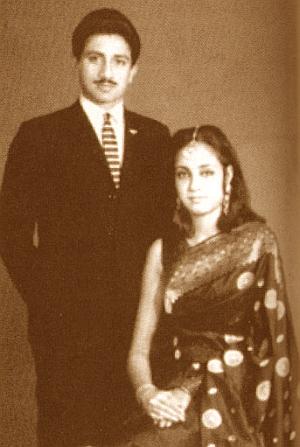 General Pervez Musharraf, the second of three brothers, was born in Delhi on August 11, 1943. His parents chose to settle in Karachi after the creation of Pakistan. He comes from a middle class family, his father having worked for the foreign ministry. He spent his early years in Turkey, from 1949 to 1956, owing to his father, the late Syed Musharrafu-ud-din’s deputation in Ankara. He claims to speak Turkish Fluently. He accepts Mustafa Kamal Ataturk as his hero.
General Pervez Musharraf, the second of three brothers, was born in Delhi on August 11, 1943. His parents chose to settle in Karachi after the creation of Pakistan. He comes from a middle class family, his father having worked for the foreign ministry. He spent his early years in Turkey, from 1949 to 1956, owing to his father, the late Syed Musharrafu-ud-din’s deputation in Ankara. He claims to speak Turkish Fluently. He accepts Mustafa Kamal Ataturk as his hero.
On return to Pakistan from Turkey, General Pervez Musharraf received his education from Saint Patrick’s High School, Karachi, and then from F. C. College, Lahore. In 1961, he joined the Pakistan Military Academy and was commissioned in Artillery Regiment in 1964. He fought in the Indo-Pakistan War of 1965 as a young officer, and was awarded Imtiazi Sanad for gallantry. He also achieved the Nishan-i-Imtiaz (Military) and the Tamgha-i-Basalat. He has been also on the faculty of the Command and Staff College, Quetta and the war wing of (the) National Defence College. He volunteered to be a commando, and remained in the Special Services Group for seven years. He also participated in the Indo-Pak War of 1971 as a Company Commander in the Commando Battalion.
A graduate of Command and Staff College, Quetta, General Musharraf also distinguished himself at the Royal College of Defense Studies, United Kingdom. During his military career, General Musharraf acquired varied experience in different command and instructional appointments. He also served as Director General Military Operations at the General Headquarters from 1993 to 1995.
General Musharraf rose to the rank of General and was appointed as the Chief of Army Staff on October 7, 1998 when Pakistan’s army chief, General Jehangir Karamat, resigned two days after calling for the army to be given a key role in the country’s decision-making process. General Musharraf was given additional charge of Chairman Joint Chiefs Staff Committee on April 9, 1999. On October 12, 1999, when through a bloodless coup the military took over the government in Pakistan, he became the head of the state designated as Chief Executive. He assumed the office of President of Pakistan on June 20, 2001. In order to legitimize and legalize his rule, General Pervez Musharraf held a referendum on April 30, 2002 thereby elected as President of Pakistan for duration of five years. In accordance with the deal with MMA (Muttahida Majlis-e-Amal), he agrees to leave the army on 31st December, 2004 but will continue to serve five-year term as President as he got vote of confidence on January 1, 2004, from the parliament and the four provincial assemblies under the provision of the 17th Amendment duly passed by the National Assembly and the Senate.
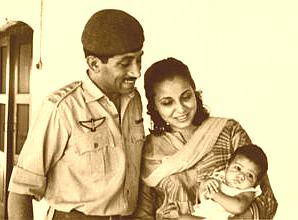 General Musharraf got married in 1968 and has two children, a son and a daughter. He loves to spend most of his leisure time playing Squash, Badminton or Golf. He also takes keen interest in water sports and has been an enthusiastic canoeist. He calls himself an avid reader, he is well versed in Military History, his favorite subject.
General Musharraf got married in 1968 and has two children, a son and a daughter. He loves to spend most of his leisure time playing Squash, Badminton or Golf. He also takes keen interest in water sports and has been an enthusiastic canoeist. He calls himself an avid reader, he is well versed in Military History, his favorite subject.
 During the three years of General Pervez Musharraf as the Chief Executive of Pakistan, the country saw more structural reforms than at any time in its history. Ranging from economic and social sector reforms to – administrative and political restructuring – improvements were carried out in almost every conceivable facet of national life. At the time he assumed office of the Chief Executive on 12th October 1999, the country was in deep economic and constitutional crisis. His administration’s remarkable achievement of pulling the, country out of the economic and political morass in a short span has been widely acknowledged. On the international front, Pakistan’s‘ image saw a major turnaround from the point where it faced diplomatic isolation.
During the three years of General Pervez Musharraf as the Chief Executive of Pakistan, the country saw more structural reforms than at any time in its history. Ranging from economic and social sector reforms to – administrative and political restructuring – improvements were carried out in almost every conceivable facet of national life. At the time he assumed office of the Chief Executive on 12th October 1999, the country was in deep economic and constitutional crisis. His administration’s remarkable achievement of pulling the, country out of the economic and political morass in a short span has been widely acknowledged. On the international front, Pakistan’s‘ image saw a major turnaround from the point where it faced diplomatic isolation.
General Pervez Musharraf was sworn in as the 11th President of Pakistan and concurrently held with it the office of Chief Executive till 23rd November, 2002: After fulfilling his commitment to the people of Pakistan to hold general elections in the country on 10th October 2002, he transferred the powers of Chief Executive to the newly elected Prime Minister. On restoration of Constitution, he was administered fresh oath of office of President on 31st October 2002.
President Musharraf, the second of three brothers, was born in Delhi on 11th August, 1943. He spent his early childhood in Ankara, Turkey, where his father was posted on a diplomatic assignment from 1949 to 1956. He was quick to pick up Turkish language during his stay and developed fluency in a very short time. Upon his return to Pakistan, he pursued his education at St. Patrick’s High School, Karachi. He was at Forman Christian College, Lahore, when he got the call to join the Pakistan Military Academy in 1961. From his college years, he has retained his keen interest in water sports such as canoeing and sailing. He also spends his leisure time playing squash, tennis and golf. An avid reader, General Musharraf is particularly well versed in military history-his favorite subject.
President Musharraf was commissioned in an artillery regiment in 1964. A graduate of Command and Staff College, Quetta, and the National Defense College, Rawalpindi, he, later in his career, returned to these internationally recognized premier military institutions to serve as a faculty member. He-also had the distinction to study at the Royal College of Defense Studies, United Kingdom.
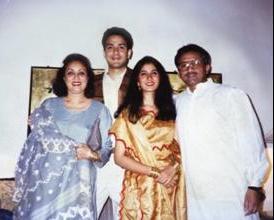 From the very start of an illustrious military career, General Musharraf excelled in his assignments. He received official recognition for valour and bravery in action during the 1965 war. He was selected to serve in the elite Special Services Group (SSG) “Commandos” and participated in the 1971 war as a company commander in a commando battalion. On promotion to the rank of major general in January 1991, he was given the command of an infantry division and later of a prestigious strike corps as lieutenant general in 1995. He was promoted to the rank of General on 7th October, 1998 and appointed the Chief of Army Staff. He also held the additional charge of Chairman Joint Chiefs of Staff Committee from April, 1999 to October, 2001.
From the very start of an illustrious military career, General Musharraf excelled in his assignments. He received official recognition for valour and bravery in action during the 1965 war. He was selected to serve in the elite Special Services Group (SSG) “Commandos” and participated in the 1971 war as a company commander in a commando battalion. On promotion to the rank of major general in January 1991, he was given the command of an infantry division and later of a prestigious strike corps as lieutenant general in 1995. He was promoted to the rank of General on 7th October, 1998 and appointed the Chief of Army Staff. He also held the additional charge of Chairman Joint Chiefs of Staff Committee from April, 1999 to October, 2001.
President Musharraf envisions Pakistan as a modern and moderate Islamic state. His bold initiatives to ensure Pakistan’s steady progression on the road to sustainable economic and social development have been internationally praised. He considers people of Pakistan as the most precious asset and, therefore, has always accorded special focus to human resource development in the country. A man who loves peace, he has shown his predisposition to dialogue over confrontation and finding just solutions to international disputes in accordance with UN resolutions.
He married Sehba Farid, on 27th December, 1968. They have two children, a son and a daughter, both now married and settled in their respective lives. General and Mrs. Musharraf are grandparents by virtue of their grand daughters, Maryam and Zainab, from daughter, Ayla.
He is now the leader of his All Pakistan Muslim Legue Party.
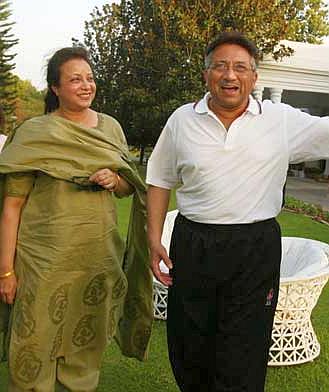
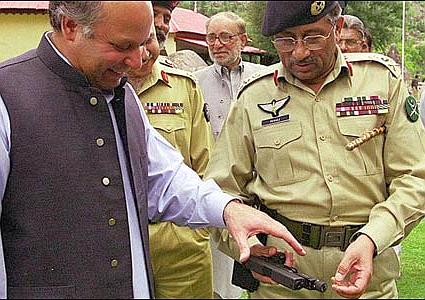
On 7 August 2008, the Pakistan Peoples Party and the Pakistan Muslim League (N) agreed to force Musharraf to step down and begin his impeachment. Asif Ali Zardari and Nawaz Sharif announced sending a formal request or joint charge sheet that he step down, and impeach him through parliamentary process upon refusal. Musharraf, however, said: “I will defeat those who try to push me to the wall. If they use their right to oust me, I have the right to defend myself.” Musharraf, accordingly delayed his departure for the Beijing Olympics, by a day. A senior coalition official told Reuters: “Yes, we have agreed in principle to impeach him.” The draft of the ruling coalition’s joint statement had been finalized by the draft Committee, and Musharraf would have to obtain vote of confidence from the National Assembly and 4 provincial assemblies. The government summoned the national assembly, or lower house of parliament, to sit on 11 August. Capt. Wasif Syed, spokesman for the Pakistan People’s Party—confirmed: “A decision has been made that he has to go now, and all the parties have agreed on this point.”[93]. It is speculated that Pervez Musharraf would have had to face corruption and even murder charges if he had kept refusing a graceful exit from the president house.
On Monday, 18 August 2008, in a speech defending his record, Musharraf announced that he had resigned.
When announcing his resignation, Musharraf, 65, said: “After viewing the situation and consulting legal advisers and political allies, with their advice I have decided to resign. I leave my future in the hands of people. Not a single charge in the impeachment can stand against me. No charge can be proved against me because I never did anything for myself, it was all for Pakistan. On the map of the world, Pakistan is now an important country, by the grace of Allah. Whether I win or lose the impeachment, the nation will lose. They don’t realize they can succeed against me but the country will undergo irreparable damage. My resignation will go to the speaker of the National Assembly today.” In an emotional one-hour speech, Musharraf raised his clenched fists to chest height, and said, “Long live Pakistan!”
“Nonetheless, despite his mistakes, he has been that rare phenomenon in Pakistani politics — an honest man with good intentions who tried to serve his country to the best of his abilities. In a country that has suffered so much over the years from corrupt and self-serving politicians, there have been too few figures like him”
In early 2007, Musharraf was extremely popular. According to a US survey, IRI President General Pervez Musharraf was more popular in Pakistan than opposition leaders Benazir Bhutto and Nawaz Sharif. Around 37 percent of the respondents were of the view that Musharraf’s supported PML-Q deserved to be re-elected.
However, by August 2007, after the lawyers Judicial Activism started, Musharraf became slightly unpopular in Pakistan due to persistent media efforts and anti-Musharraf talk shows. An International Republican Institute survey, taken of 3000 people, showed that 64 percent of the population did not want another term to be granted to Musharraf as the president of Pakistan.
Musharraf’s popularity grew after his resignation and several pro-Musharraf websites and groups on Facebook emerged.
In the most recent interview with Musharraf, Daphne Barak admits that she receives mails and people have started missing Musharraf: “Many emails are relatively flattering to you. I even have emails from PPP members who say that they never thought they will miss you, but they do. Especially young people!”
After resignation, Musharraf went for an expected pilgrimage to Mecca. He may also continue his travelling on a lucrative speaking tour through Middle East, Europe and United States. Chicago-based Embark LLC is one of the international public-relations firms trying to land Musharraf as a highly paid keynote speaker.[98] According to Embark President David B. Wheeler, the speaking fee for Musharraf would be in the $150,000-200,000 range for a day plus jet and other V.I.P. arrangements on the ground.
Musharraf disclosed that he has planned to jump back into full time politics but not until he moves into his newly constructed house in Chak Shahzad in Rawalpindi/Islamabad as he does not want to misuse the army house for political purposes.
His speech at the Amway Grand Plaza Hotel in January 2009 marked his first U.S. appearance since he left office last year, as he embarks on a international speaking tour. The former president of Pakistan pleaded for understanding in his country’s fight against terrorism, in a region deemed central to the outcome of that battle. “Pakistan has confronted terrorism and extremism for more than two decades now,” Pervez Musharraf said in a speech to about 500 people at the World Affairs Council of Western Michigan event.
Regarding the Lahore attack on Sri Lankan players, Musharraf criticized the police commandos’ inability to kill any of the gunmen, saying “If this was the elite force I would expect them to have shot down those people who attacked them, the reaction, their training should be on a level that if anyone shoots toward the company they are guarding, in less than three seconds they should shoot the man down.”
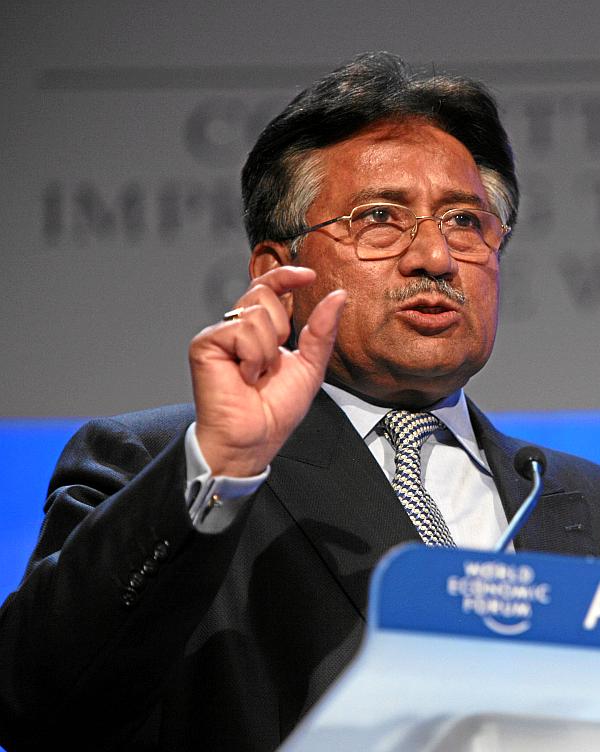
The PML Nawaz have tried to get Pervez Musharraf to stand trial in an article 6 trial for treason in relation to the emergency on November 3, 2007[103], which Musharraf signed as Chief of Army Staff instead of in his position as President of Pakistan[104], yet revoked it as the President of Pakistan, also revoking the PCO of 3rd November.
The Prime Minister of Pakistan Yousaf Raza Gilani has said a consensus resolution is required in national assembly for an article 6 trial of Pervez Musharraf “I have no love lost for Musharraf … if parliament decides to try him, I will be with parliament. Article 6 cannot be applied to one individual … those who supported him are today in my cabinet and some of them have also joined the PML-N … the MMA, the MQM and the PML-Q supported him … this is why I have said that it is not doable,” said the Prime Minister while informally talking to editors and also replying to questions by journalists at an Iftar-dinner he had hosted for them.
Meanwhile, Proclamation of Emergency and Revocation is the constitutional right of the President of Pakistan, according to the constitution of Pakistan, Article 232 and Article 236.[108] On 15 February 2008, the Supreme Court has delivered detailed judgement to validate the Proclamation of Emergency on 3 November 2007, the Provisional Constitution Order No 1 of 2007 and the Oath of Office (Judges) Order, 2007.
Saudi Arabia have agreements in place to stop any article 6 trial in Pakistan in relation to Pervez Musharraf according to the newspapers due to Saudi Arabia’s long standing friendship with all of the political parties in Pakistan. Sharif is under tremendous pressure from Saudi Arabia to shun his demand for Musharraf’s trial under the Article Six of the Constitution
The President of PML-Q, Chaudhry Shujaat Hussain has said that those vying for article 6 against Musharraf to suffer and would themselves get embroiled in trouble.[113] Secretary General of PML-Q Mushahid Hussain Sayed, also ruled out Musharraf’s trial under Article-6 of the Constitution.
Abbottabad’s district and sessions judge in a missing person’s case passed judgment asking the authorities to declare Pervez Musharraf a proclaimed offender.
Edited and research by Jamal Panhwa
Posted by admin in Pakistan-A Nation of Hope on November 19th, 2013
Posted by Belharvi
QUETTA- “Amidst Baloch’s right of independence, the concept of greater Baluchistan, Sabotage as a tool for political struggle, despotism of Punjab and plight of oppressed nations and Media-friendly methods of mass protest are parts of the sponsored theme of Indian Secret Service RAW inflicting irrecoverable damages to the integrity of Pakistan” a high ranking intelligence official revealed Baluchistan Chronicle.
Chit recovered from the body of a person killed by rebels in Baluchistan
He said, “The lines are muddy and there are no clear-cut sectors to distinguish friends from rivals’ therefore India’s increasing role in Afghanistan under the garb of reconstruction and rehabilitation projects aims to boost their deadly game going on in the barren and hostile hills of Baluchistan”.
“Senior Intelligence officials of top agencies on the trail of insurgency in Baluchistan for years in a report filled to government, provided concrete evidence showing India and Afghanistan facilitating the banned insurgent organizations in spreading terrorism in Baluchistan” official added.
He said, “The report revealed that the banned militant groups are receiving arms and ammunition from Afghanistan and from some other locations including Kishangarh, a small Indian town, barely five kilometers from Pakistan’s border where the provinces of Punjab and Sindh meet. A supply depot and a training centre is also operating in Kishangarh under RAW’s umbrella where Anti- Pakistan elements maintains contacts with militant training camps in Baluchistan”.
“There is a high level logistics support depot near Indian village Shahgarh, in the province of Madhya Pradesh, about 90 kilometers from Kishangarh which is also in the use of Indian intelligence agents and they are using the area as a launching pad for the Indian supplies to anti Pakistan elements” intelligence official told.
Intelligence services in joint raids held several key Indian agents involved in such supplies and in interrogation they further disclosed that, they had sent a number of trucks of explosives and arms to militants in Sui, Sibi, and Kohlu districts of Balochistan.
The report disclosed that the Indian consulate in Zahidan, Iran, has hired a house off Khayaban Danishgah, near Hotel Amin in Zahidan and that house is being using for accommodating those payroll agents who cross over from Afghanistan to Pakistan and from Pakistan to Iran through the domed passage.
Under the prevalent environs Baluchistan issue is being popping up with more vigor at the central stage of national arena.
RAW in collaboration with Afghan Intelligence Agency NDS is also actively providing covert financial and weapons support to the banned Baloch militant groups of Baluchistan via Afghan border close to Chaman, and using Afghan illegal immigrants’ for the task.
Evidence suggests that Baluchistan rebels are being harbored at various places and training camps, located at Kabul, Nimroz, Kandahar . Hilmond. Shorawak and Ghazni provinces of Afghanistan and after training they were being sent to Baluchistan for anti-peace crusade.
Sources told that in order to overcome the linguistic problems in future, Indian RAW is also involved in arranging Balochi language courses in India for Afghan intelligence operatives through Balochi instructors, that their expertise could be utilized for further unrest in Baluchistan through terrorist activities.
Balochistan has a long porous border with Afghanistan. The Indian consulate in Kandahar, a border town, provides a firm base to train, arm and dispatch militants across the border to undertake sabotage activities in the province
Security forces fighting militants in Balochistan had seized different weapons and equipments that bear Indian marking from the possession of militants killed or captured during different actions.
Earlier the former Commander of US troops in Afghanistan, General Stanley Mcchrysal, also in a report to the American Congress stated that the burgeoning Indian influence in Afghanistan was a destabilizing factor in the region.
Sources told that, Afghan border forces commander in Spin Boldak , Abdul Raziq is also fuelling militancy in Baluchistan by providing training and weapons to the militants engaged in subversive activities in Baluchistan.
“Indian Consulate in Kanadahar hired commander Raziq’s services for providing weapons and other equipment to Baloch rebels in Kandahar who later traveled to Baluchistan” they added.(By )
Posted by admin in Pakistan-A Nation of Hope on November 19th, 2013
Aye Puttar Hattan Te Nayein Wikday
Aye puttar hattan te nayein wikday
Aye puttar hattan te nayein wikday
Ki labni aye wich bazaar kure?
Aye dain aye mere data di
Aye dain aye mere data di
Na aiwein takran maar kure!
Aye puttar hattan te nayein wikday
Aye puttar wikao cheez nayein
Aye puttar wikao cheez nayein
Mul de ke choli paiye ni
Aye aida sasta maal nayein
Kiton ja ke mang liyaiyni
Aye sauda nakd wi milda nayein
Tu labdi phirein udhar kure!
Aye putar hattan te nayein wikday
Aye sher bahadur ghazi nein
Aye sher bahadur ghazi nein
Aye kise kolun wi harde nayein
Ena dushmanan kolon ki darna
Aye maut kolon wi darde nayein
Aye apne desh di izzat toun
Jaan apni dende waar kure!
Aye puttar hattan te nayein wikday
Tan bagh nein ona ma’waan de
Tan bagh nein ona ma’waan de
Jinna ma’waan de aye jaye nein
Tan bagh nein pain parawaan de
Jina goudeyan weer khidaye nein
Aye maan nein maanan waliyan de
Nayein aye
Aye puttar hattan te nayein wikday